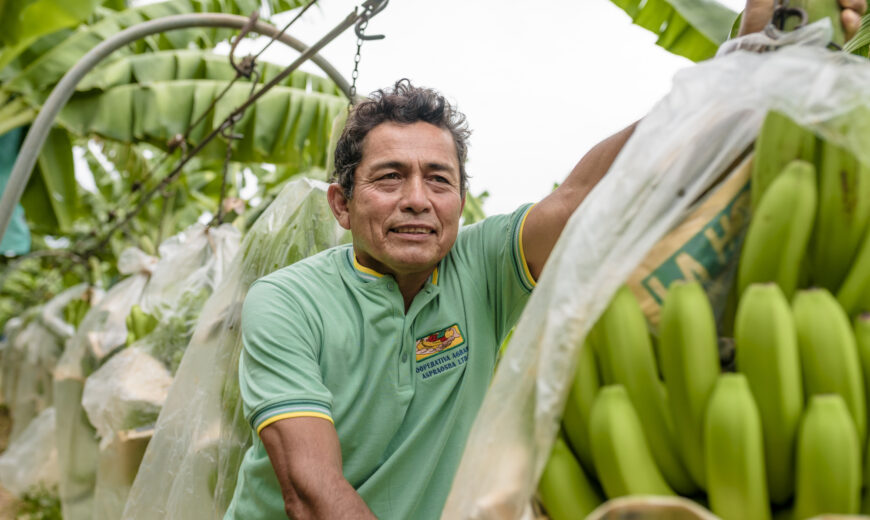19 Sep 2023
The future of food

Securing our food systems for a sustainable future.
By Juan Pablo Solis, Senior Advisor for Climate & Environment, Fairtrade International.
Climate change and unbalanced trade relations have pushed our global food systems to the brink of extinction. According to the scientific community, we urgently need a systemic change to secure healthy food for a growing population. In 2023, the United Nations is calling for stocktaking moments to reflect on our current food system, and to review the scope of the Paris Agreement. As the clock is ticking, evidence shows that, as a global society, we are failing to achieve the goals set by the Agenda 2030.
In a post pandemic era, characterised by tangible climate crisis and social division, we keep asking for climate and social justice in international trade. Always centred and inspired by the voices of producers and farm workers from across the world which are critical to deliver on Agenda 2030.
With our ground-breaking policy on sustainable agriculture, we reaffirm these commitments, and the role that trading fairly plays in achieving sustainable livelihoods among smallholder producers and workers.
The importance of policies based on farmer’s realities
The current scenario may look pessimistic as we see more and more catastrophic effects of climate change worldwide. As the population grows, the demand for food increases. However, yields decrease when producers are not equipped or capable to achieve resilience and adapt adequately. There is a huge gap between conversation at the political level and the needs of smallholder farmers.
As stated by Felix Tetteh, a cocoa producer from Ghana and Fairtrade Ambassador, “Policies can only be fruitful if us, producers, are involved in the dialogue and decision-making process. Only in this way, we can reach effective policies, ensuring the future of a sustainable production.”
A fair transformation of our food system requires that all of us - including public and private sector- break silos and collaborate to promote and environment where smallholder farmers have better access to key resources for a sustainable transition. This includes government also fulfilling on their climate promise when it comes to financing.
”Producers are agents of change and should be more recognised in this way. They are a relevant part of the supply chain and they know their land.”, highlights Marike de Peña, Chair of the Latin-American producer network, CLAC.
As we see previously voluntary requirements on human rights and the environment become mandatory in territories like the EU, we welcome this approach, but do emphasise that it is critical to include the voice of rightsholders as policies are being shaped.
In this context, at Fairtrade we view ourselves as a facilitator more than simply a standard setter. We have been building bridges across different actors within food systems, particularly making sure that farmers are heard
It may be challenging, but we believe that with the rights voices at the table – and following on commitments - a fair food system is possible. As rightly said by Christiana Figueres, climate change needs stubborn optimists. And you can certainly count us in that group.
For more information about Fairtrade and climate visit our dedicated section.